|NURSING MATERIALS_Solutions|Quality work From me.
On this page you will get all documents you need in your career Excellence. (Exams,Notes,Summary,Case,Essay and many more documents). All the best in you study. Message me if you can not find the document you are looking for and i will assist you. Thanks again for purchasing my documents and Review to help others who need the best doc, Also refer others so that they can benefit from my document .
- 1036
- 0
- 65
Community
- Followers
- Following
687 Reviews received
1110 items
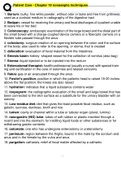
Patient Care - Chapter 19 nonaseptic techniques
1. Barium: bulky, fine white powder, without odor or taste and free from grittiness; used as a contrast medium in radiography of the digestive tract 2. Bedpan: vessel for receiving the urinary and fecal discharges of a patient unable to leave his or her bed 3. Colonoscopy: endoscopic examination of the large bowel and the distal part of the small bowel with a charge-coupled device camera or a fiberoptic camera on a flexible tube passed through the anus 4. colostomy: surgical creation of an op...
- Exam (elaborations)
- • 4 pages •
1. Barium: bulky, fine white powder, without odor or taste and free from grittiness; used as a contrast medium in radiography of the digestive tract 2. Bedpan: vessel for receiving the urinary and fecal discharges of a patient unable to leave his or her bed 3. Colonoscopy: endoscopic examination of the large bowel and the distal part of the small bowel with a charge-coupled device camera or a fiberoptic camera on a flexible tube passed through the anus 4. colostomy: surgical creation of an op...
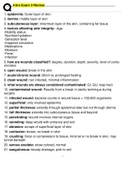
Intro Exam 3 Review
1. epidermis: Outer layer of skin 2. dermis: middle layer of skin 3. subcutaneous layer: innermost layer of the skin, containing fat tissue 4. factors affecting skin integrity: -Age -Mobility status -Nutrition/hydration -Sensation level -Impaired circulation -Medications -Moisture -Fever -Infection 5. how are wounds classified?: degree, duration, depth, severity, level of conta- mination 6. open wound: break in the skin
- Exam (elaborations)
- • 9 pages •
1. epidermis: Outer layer of skin 2. dermis: middle layer of skin 3. subcutaneous layer: innermost layer of the skin, containing fat tissue 4. factors affecting skin integrity: -Age -Mobility status -Nutrition/hydration -Sensation level -Impaired circulation -Medications -Moisture -Fever -Infection 5. how are wounds classified?: degree, duration, depth, severity, level of conta- mination 6. open wound: break in the skin
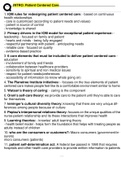
INTRO: Patient Centered Care
1. IOM rules for redesigning patient centered care: - based on continuous health relationships - care is customized (according to patient needs and values) - patient is source of control - knowledge is shared 2. Primary drivers in the IOM model for exceptional patient experience: - leadership - focused on family and patient - hearts and minds - being fully engaged - respectful partnership with patient - anticipating needs - reliable care - focused on quality - evidence-based practice 3....
- Exam (elaborations)
- • 11 pages •
1. IOM rules for redesigning patient centered care: - based on continuous health relationships - care is customized (according to patient needs and values) - patient is source of control - knowledge is shared 2. Primary drivers in the IOM model for exceptional patient experience: - leadership - focused on family and patient - hearts and minds - being fully engaged - respectful partnership with patient - anticipating needs - reliable care - focused on quality - evidence-based practice 3....
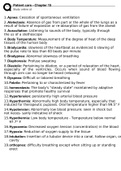
Patient care - Chapter 15
1. Apnea: Cessation of spontaneous ventilation 2. Atelectasis: Absence of gas from part or the whole of the lungs as a result of failure of expansion or re-absorption of gas from the alveoli 3. Auscultation: Listening to sounds of the body, typically through the us of a stethoscope 4. Body Temperature: Measurement of the degree of heat of the deep tissues of the human body 5. Bradycardia: slowness of the heartbeat as evidenced b slowing of the pulse rate to less than 60 beats per minute
- Exam (elaborations)
- • 5 pages •
1. Apnea: Cessation of spontaneous ventilation 2. Atelectasis: Absence of gas from part or the whole of the lungs as a result of failure of expansion or re-absorption of gas from the alveoli 3. Auscultation: Listening to sounds of the body, typically through the us of a stethoscope 4. Body Temperature: Measurement of the degree of heat of the deep tissues of the human body 5. Bradycardia: slowness of the heartbeat as evidenced b slowing of the pulse rate to less than 60 beats per minute
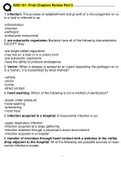
RAD 101: Final Chapters Review Part II
1. infection: The process of establishment and growth of a microorganism on or in a host is referred to as: -inflammation -infection -pathogen -prokaryotic nosocomial 2. are eukaryotic organisms: Bacteria have all of the following characteristics EXCEPT they: -are single-celled organisms -may live on a host or in a colony form -are eukaryotic organisms -have the ability to produce endospores 3. Vector: When a disease is spread by an insect depositing the pathogen on or in a human, ...
- Exam (elaborations)
- • 10 pages •
1. infection: The process of establishment and growth of a microorganism on or in a host is referred to as: -inflammation -infection -pathogen -prokaryotic nosocomial 2. are eukaryotic organisms: Bacteria have all of the following characteristics EXCEPT they: -are single-celled organisms -may live on a host or in a colony form -are eukaryotic organisms -have the ability to produce endospores 3. Vector: When a disease is spread by an insect depositing the pathogen on or in a human, ...
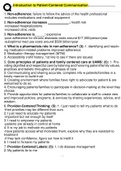
Introduction to Patient-Centered Communication
1. Non-adherence: failure to follow the advice of the health professional -includes medications and medical equipment 2. Non-adherence increases .: health risk -increased hospitalizations -increased clinic visits 3. Non-adherence is : expensive -poor adherence for chronic diseases costs around $17,000/person/year -suboptimal med use costs around $500 billion/year 4. What is a pharmacists role in non-adherence? (3): 1. identifying and resolv- ing medication-related problems improved a...
- Exam (elaborations)
- • 4 pages •
1. Non-adherence: failure to follow the advice of the health professional -includes medications and medical equipment 2. Non-adherence increases .: health risk -increased hospitalizations -increased clinic visits 3. Non-adherence is : expensive -poor adherence for chronic diseases costs around $17,000/person/year -suboptimal med use costs around $500 billion/year 4. What is a pharmacists role in non-adherence? (3): 1. identifying and resolv- ing medication-related problems improved a...
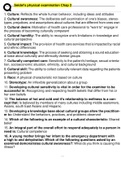
Seidel's physical examination Chap 2
1. Culture: Reflects the whole human behavior, including ideas and attitudes 2. Cultural awareness: The deliberate self examination of one's biases, stereo- types, prejudices, and assumptions about cultures that are different from ones own 3. Cultural desire: Motivation of health care professional to "want to" engage in the process of becoming culturally competent 4. Cultural humility: The ability to recognize one's limitations in knowledge and cultural perspective 5. Cultural impact: Th...
- Exam (elaborations)
- • 2 pages •
1. Culture: Reflects the whole human behavior, including ideas and attitudes 2. Cultural awareness: The deliberate self examination of one's biases, stereo- types, prejudices, and assumptions about cultures that are different from ones own 3. Cultural desire: Motivation of health care professional to "want to" engage in the process of becoming culturally competent 4. Cultural humility: The ability to recognize one's limitations in knowledge and cultural perspective 5. Cultural impact: Th...
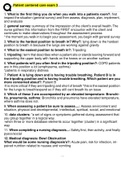
Patient centered care exam 3
1. What is the first thing you do when you walk into a patients room?: first inspect the situation (general survey) and then assess, diagnosis, plan, implement, and evaluate 2. general survey: summary of the impression of the client's overall health. The nurse gathers this information from the FIRST encounter with the client and continues to make observations throughout the assessment process * the moment you walk in to begin your assessment, you begin with general survey 3. What is the hard...
- Exam (elaborations)
- • 5 pages •
1. What is the first thing you do when you walk into a patients room?: first inspect the situation (general survey) and then assess, diagnosis, plan, implement, and evaluate 2. general survey: summary of the impression of the client's overall health. The nurse gathers this information from the FIRST encounter with the client and continues to make observations throughout the assessment process * the moment you walk in to begin your assessment, you begin with general survey 3. What is the hard...
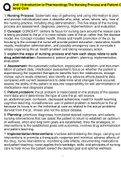
Exam 1- Introduction to patient centered care.
1. Narrative Charting: -"Story" of care in chronological format -Tracks the client's changing status -Can be lengthy -Should be organized 2. PIE Charting: Problem Interventions Evaluation -Used only in problem-oriented charting -Establishes an ongoing plan of care 3. SOAP/SOAPIER Charting: Subjective data Objective data Assessment Plan Intervention Evaluation Revision 4. Focus Charting: Highlights the client's concerns, problems, or strengths in three columns Column 1: Time an...
- Exam (elaborations)
- • 5 pages •
1. Narrative Charting: -"Story" of care in chronological format -Tracks the client's changing status -Can be lengthy -Should be organized 2. PIE Charting: Problem Interventions Evaluation -Used only in problem-oriented charting -Establishes an ongoing plan of care 3. SOAP/SOAPIER Charting: Subjective data Objective data Assessment Plan Intervention Evaluation Revision 4. Focus Charting: Highlights the client's concerns, problems, or strengths in three columns Column 1: Time an...
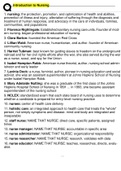
Introduction to Nursing
1. nursing: the protection, promotion, and optimization of health and abilities, prevention of illness and injury, alleviation of suffering through the diagnosis and treatment of human response, and advocacy in the care of individuals, families, communities, and populations 2. Florence Nightingale: Established sanitary nursing care units. Founder of mod- ern nursing. began professional education of nursing. 3. Clara Barton: founded the American Red Cross 4. Lillian Wald: American nurse, human...
- Exam (elaborations)
- • 2 pages •
1. nursing: the protection, promotion, and optimization of health and abilities, prevention of illness and injury, alleviation of suffering through the diagnosis and treatment of human response, and advocacy in the care of individuals, families, communities, and populations 2. Florence Nightingale: Established sanitary nursing care units. Founder of mod- ern nursing. began professional education of nursing. 3. Clara Barton: founded the American Red Cross 4. Lillian Wald: American nurse, human...

ATI Maternal newborn Quiz 2; QUESTIONS & ANS 100% CORRECTLY VERIFIED GRADED A+
CON 3990 EXAM FAR PARTS ACTUAL EXAM QUESTIONS AND CORRECT ANSWERS [DETAILED ANSWERS] 2024 UPDATED VERSION |ALREADY GRADED A+
CRPC EXAM PRACTICE EXAM 2023-2024 ACTUAL EXAM COMPLETE QUESTIONS AND CORRECT DETAILED ANSWERS WITH (VERIFIED ANSWERS) |ALREADY GRADED A+
ATI NUTRITION PROCTORED EXAM 2019 (70 COMPLETE QUESTIONS AND ANSWERS) 2023/2024 UPDATE GRADED A+
FUNDAMENTALS ATI RN 2019 ACTUAL EXAM COMPLETE 300+ QUESTIONS AND ANSWERS [VERIFIED ANSWERS] LATEST UPDATE 20232024 GRADED A+